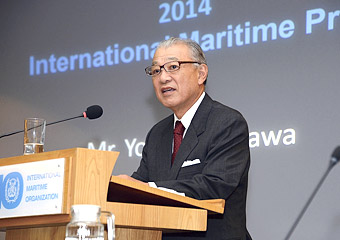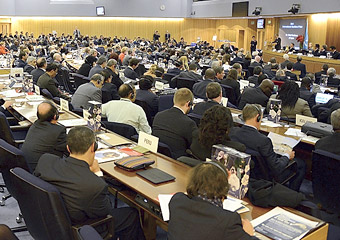- Top
- Publications
- Ocean Newsletter
- Toward a Sustainable Ocean for the Next Generation ~Address at the IMO International Maritime Prize Awarding Ceremony, London~
Ocean Newsletter
No.370 January 5, 2016
-
Toward a Sustainable Ocean for the Next Generation ~Address at the IMO International Maritime Prize Awarding Ceremony, London~
Yohei SASAKAWA
Chairman, The Nippon Foundation
Selected Papers No.20On July 20th, the 20th anniversary of Japan's Oceans Day, as well as the following day, the Maritime Bureau of the Ministry of Land, Infrastructure, Transport and Tourism hosted the IMO World Maritime Day Parallel Site 2015, a first for the country. Over the two days, an international symposium took Maritime Education and Training as its theme, the results of which were included in the Yokohama Declaration.
Selected Papers No.20 -
IMO World Maritime Day Parallel Site 2015
Toshinobu KAWAMURA
Manager, General Affairs Division, Maritime Bureau, Ministry of Land, Infrastructure, Transport and TourismOn July 20th, the 20th anniversary of Japan's Oceans Day, as well as the following day, the Maritime Bureau of the Ministry of Land, Infrastructure, Transport and Tourism hosted the IMO World Maritime Day Parallel Site 2015, a first for the country. Over the two days, an international symposium took Maritime Education and Training as its theme, the results of which were included in the Yokohama Declaration. -
Seeds-Ship-Ocean Floor-Bricks
Katsuhiko HIBINO
Artist / Professor, Tokyo University of the ArtsHow do art projects come to be born? In this article, I want to recount how the Seed is a Ship-Voyage Project, born from the seeds of morning glories, developed around the country, resulting in a voyage to 35 ports. While reflecting on the relevance of art to social problems in local communities, I would also like to introduce our next, new project.
Toward a Sustainable Ocean for the Next Generation ~IMO International Maritime Prize Awarding Ceremony, London~
 ■Chairman Sasakawa's speech on receiving the IMO International Maritime Prize.
■Chairman Sasakawa's speech on receiving the IMO International Maritime Prize.
I would also like to express my deepest grief and condolences to the innocent victims and the bereaved families of the recent outrageous attacks in Paris.
Now, let me express my sincere respect to the International Maritime Organization, for all its efforts for the maintenance of maritime safety and security and the prevention of marine pollution by ships. Indeed, I believe the important role played by IMO deserves to be widely recognized when we consider that maritime transport is said to account for more than 90% of global trade.
As I stand before you, I am greatly humbled and honoured to accept this prestigious prize, not alone, but together with the 1,099 Sasakawa/Nippon Foundation Fellows from 131 countries and our partner institutions who have so dedicatedly provided education and guidance to their students.
 ■The IMO International Maritime Prize Awarding Ceremony at IMO headquarters in London.
■The IMO International Maritime Prize Awarding Ceremony at IMO headquarters in London.
Looking back, we began our project for ocean related human resource development in the 1980's. At that time Grotius' principle of "freedom of the seas" had become outdated and the United Nations Convention on the Law of the Sea was adopted, which applies the common heritage of mankind principle to the use and management of the ocean resources beyond national jurisdiction.
To support the global ocean governance, and fill the gap of global human resource capacity, The Nippon Foundation began our work of "Nurturing a New Generation of Ocean Professionals", in particular, from developing countries, at institutions such as World Maritime University and International Maritime Law Institute. We now have a network of more than one thousand fellows all over the world and we will strive to expand and strengthen this network ever more.
In recent years, we have witnessed that the problems related to our oceans arise from various interrelated causes. Therefore it has become indispensible that we have specialists who are able to apply a more comprehensive perspective that crosses disciplinary boundaries.
It is for this reason that The Nippon Foundation has also been giving importance to the ocean related human resource development of young experts who can develop holistic perspectives and knowledge. Currently, we have partnered with six universities, including Cambridge and Princeton to establish a program that brings together experts from around the world in various fields such as climate change, ocean policy, biodiversity, fisheries, ocean resource economics, and law of the sea to predict the future of our oceans. I am renewing my commitment to working for the capacity building of the future generations to project a more holistic and global vision for oceans and people.
Excellencies, ladies and gentlemen. I am however deeply concerned at the fact that the state and problems of our oceans are growing increasingly serious.
Allow me to spend few minutes to mention some of my concerns.
Overfishing has led to the destruction of ecosystem balance in different parts of the world, and it is said that about 50% of the world's marine life has been lost over the past 40 years. Climate change can increase large-scale natural disasters with significant impact on all life on Earth.
Acidification of the oceans is the cause of devastating biological damage such as to the coral reefs. Rising sea levels are threatening the lives of island nations of the South Pacific.
Legal and policy challenges confront us over the development of newly discovered deep-sea resources. There is also the issue of the management of the high seas which cover two thirds of the oceans. The battle to win maritime rights threatens the security and stability of the principle of "common heritage of mankind."
As countries assert their rights and interests, the oceans, which are supposed to be our common heritage as one, are being split into pieces. Each of us, though we may be unaware, is involved in the deprivation of ocean resources that belong to future generations.
Crises that are challenging the oceans are becoming more and more serious. We remain ignorant of them as they silently continue to grow. Furthermore, the ever deepening crises of the oceans are left unaddressed. Unless we confront today these issues of the oceans and take effective measures without delay, a time will come when human existence itself will be threatened.
I am well aware of the major role UNCLOS has played in maintaining international order, providing a legal framework for all maritime activities. However, due to changes in society and environment, we now face problems that could not have been imagined before. We need to recognize that it is not enough to deal with them just through existing international organizations and conventional frameworks.
Now is the time for us to seek a new framework of ocean governance that will enable us to effectively solve the problems of the oceans. This new framework will not simply solve current problems to ensure that our finite oceans are passed on to the next generations. But it will be a new framework that addresses the changes of the ocean and, "designs the future of the oceans", while providing hope for future generations. I believe this calls for a new global organization that can address the issues of ocean governance from a holistic and an integrated perspective.
I feel that many of us share these concerns and the need to take responsibility, consider the future of the oceans, and take appropriate action. But there is also a bright side to our challenges that there are young people who are well aware of the situation of the ocean today and what it will in the future if left unattended. It is my wish that an integrated framework of ocean governance be established and that, coupled with the abilities of the young professionals we have nurtured, will enable the crises to be overcome, leaving abundant and beautiful oceans for future generations.

